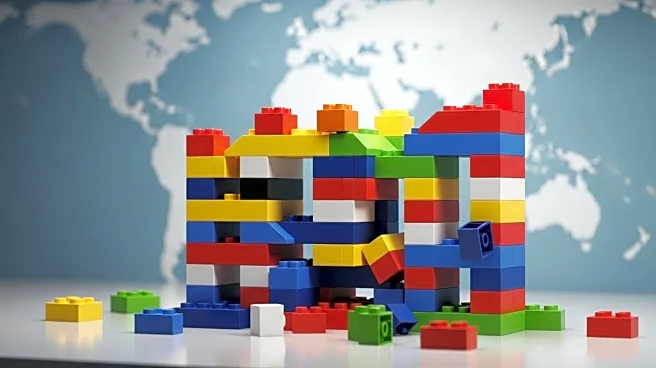What is the story about?
What's Happening?
Lego has announced a halt in the shipment of individual pieces to the United States and Canada, a decision influenced by the economic repercussions of tariffs introduced during President Trump's administration. The tariffs have increased global shipping costs, affecting various industries, including the toy sector. As a result, Lego's Pick a Brick program, which allowed consumers to order specific pieces, will no longer be available for over 2,500 pieces. This change took effect on August 25, just before the elimination of the de minimis trade exemption on August 29, which previously allowed goods valued under $800 to be imported without additional fees. The Danish company will continue to offer its bestseller collections, but the unavailability of standard pieces complicates the process for enthusiasts seeking specific components for complex builds.
Why It's Important?
The decision by Lego to halt the shipment of individual pieces underscores the broader impact of trade policies on consumer goods and industries. The tariffs have led to increased costs, affecting not only businesses but also consumers who now face limited access to products. This development highlights the interconnectedness of global trade policies and their direct effects on everyday consumer experiences. For Lego enthusiasts, particularly those in the U.S. and Canada, this means a significant reduction in the availability of parts needed for custom builds, potentially affecting the hobbyist community and sales. The situation reflects the challenges companies face in adapting to changing trade regulations and the potential for increased costs to be passed on to consumers.
What's Next?
Lego has described the halt in shipments as a temporary measure, suggesting that there may be future adjustments depending on changes in trade policies or shipping costs. Consumers and industry stakeholders will likely monitor any developments in trade negotiations or policy shifts that could alleviate the current restrictions. Additionally, Lego may explore alternative solutions to meet consumer demand, such as expanding the range of bestseller pieces or finding cost-effective shipping methods. The broader toy industry may also advocate for policy changes to mitigate the impact of tariffs on their operations.

















